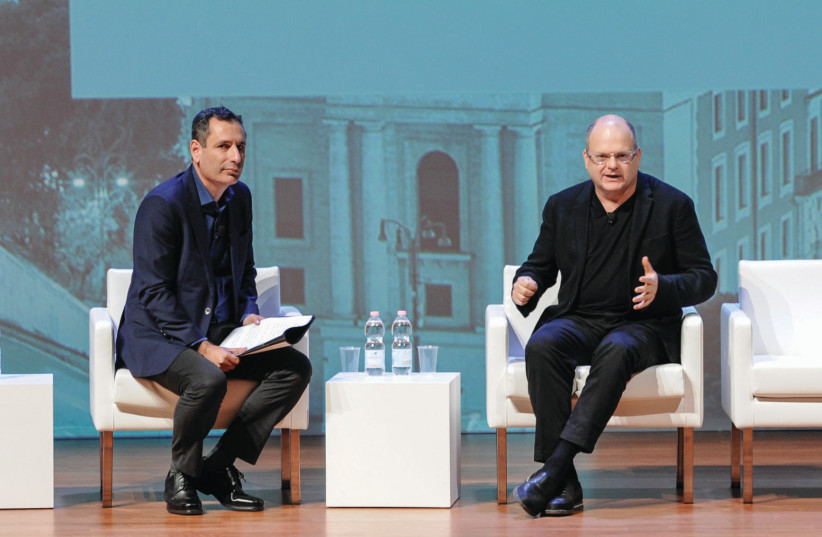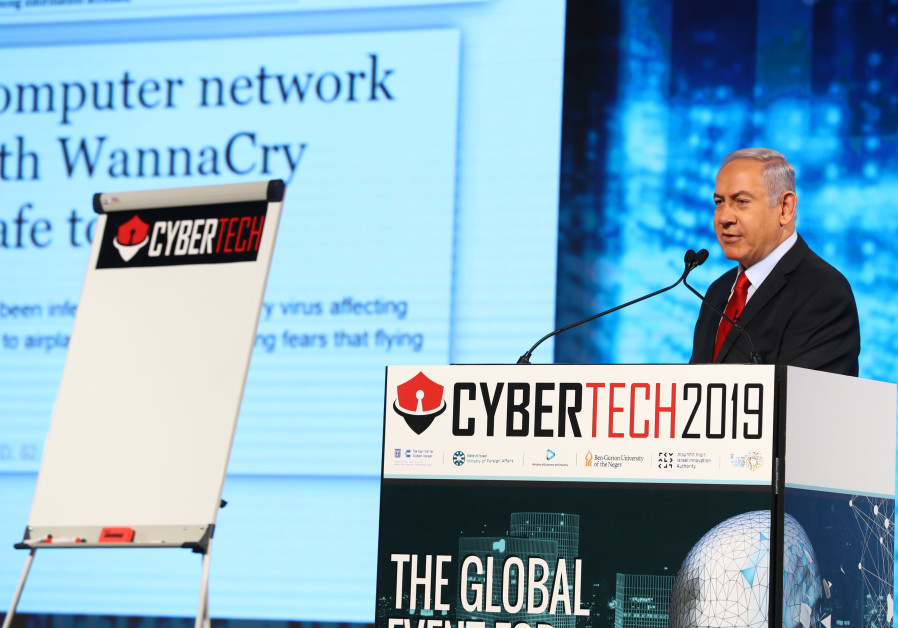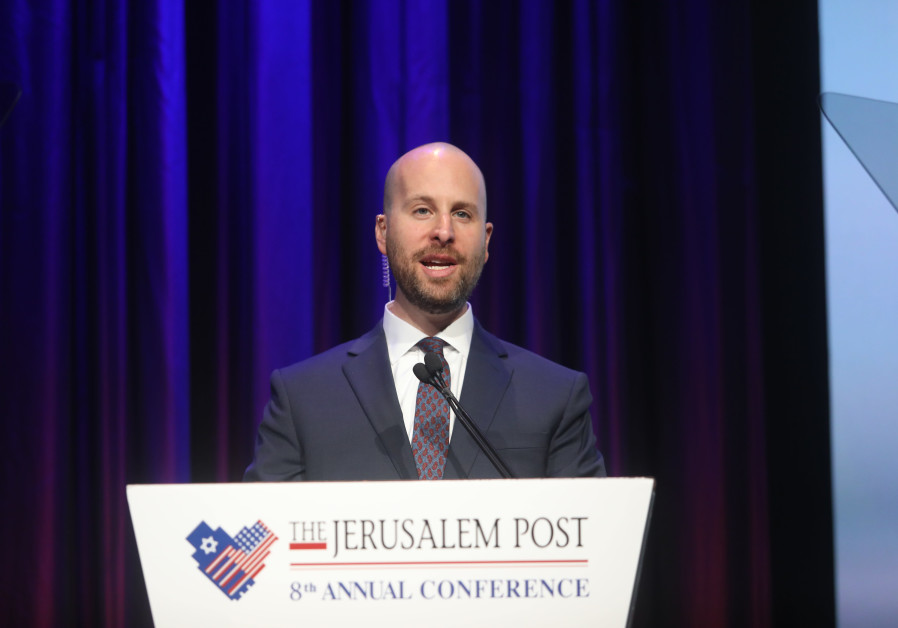 We did not need the latest Iranian cyberattack on Israeli sites or their attempt a few weeks ago to attack the water supply to understand that the next front would begin not on the ground, but on the Internet.
We did not need the latest Iranian cyberattack on Israeli sites or their attempt a few weeks ago to attack the water supply to understand that the next front would begin not on the ground, but on the Internet.
The world of cyber affects not only warfare and hackers, but every area of our lives. Anyone who was skeptical about this has learned over the last two months during the corona crisis that life could continue in another dimension. Did we say cyber?
With excellent timing, this month, the Jerusalem Post Group is launching a new Internet initiative – a cross-platform collaboration with Cybertech, the content-producing firm. The goal is to create content on the area of cyber on digital media, podcasts and pre-recorded broadcasts that will focus on the topic, together with The Jerusalem Post. The content will appear on the new Cybertech News section that will be part of the Jerusalem Post website. The section is intended not only for the general public that is interested in cyber issues, but also for those who only now have come to the realization that soon cyber will be an integral part of daily life.
“The cyber issue has recently become the hottest issue not only in the State of Israel, but also in large parts of the Middle East,” says Yaakov Katz, editor-in-chief of the Post. “The recent attacks from Iran, the breach of Israeli sites and the like have put the issue on the map openly and visibly. If we previously thought that the subject of cyberattacks was hidden, it is now out in the open. Cybertech is essentially a hub for knowledge and excellence on all cyber issues today dealing with content, conferences, production and content creation. As the editor, I see what people want to read and this is definitely an Israeli success story.”
“We were looking for a content partner that could deliver the most relevant and engaging content for our readers around the world,” says Jerusalem Post Group CEO Inbar Ashkenazi. “The goal of the productive collaboration is also to create content for a potential professional audience, awareness among the general public, and access to content, which is relevant to everyone these days. The cyber world touches every area of our lives, from securing our personal information to dealing more broadly with issues of the day.”
A world-changing event
Cybertech is a content and information platform that began with a conference held in January 2014, by founder and owner Amir Rapaport, a former military correspondent and commentator for Yediot Aharonot and Maariv, who founded the website and magazine Israel Defense, which deals with security and technology.
 PRIME MINISTER Benjamin Netanyahu at Cybertech 2019.
PRIME MINISTER Benjamin Netanyahu at Cybertech 2019.
“The story of cyber is nothing short of a revolution. One could even say it is as important as the Industrial Revolution. It’s a world-changing event,” Rapaport says. “Apart from the cyberattacks that we hear about, this is a revolution based on a broad area of life, in the automotive world as well as in the health care worlds. Corona centers and corona tracking, for that matter are cyber worlds. And of course, in the areas of wars and aviation – everything is switching to cyber.”
In 2011, the State of Israel decided to establish a cyber venture under the prime minister’s direction, which included investment in education, in ventures in the field, and development of an environment that promotes cyber entrepreneurship.
“Israel has unique advantages in the field,” Rapaport explains. “We have a lot of manpower that comes from IDF intelligence units, people who are very experienced in cyber and, of course, good universities and investment in the field.” As part of the Israeli investment in cyber and the interest created, Cybertech, the content project, was also created.
How did it begin?
“We created the first event in the country – a conference that took all of the industries and reached thousands of people from all over the world. Everyone wanted to know what cyber was. Everyone was here, and our first conference soon became the largest cyber conference held outside the US. We have held the conference annually since January 2014, and it has become phenomenal.”
The Israeli brand Cybertech has spread its wings and has been adopted by many countries in the form of other Cybertech conferences held around the globe. Rapaport says that little Israel is considered a cyber superpower worldwide.
“Putting aside China for a moment, Israel is No. 2 in the world after the US and is considered a cyber power, to the extent that Israel has more cyber companies and research institutes than all the countries of the world together, except the US.”
In addition, about 20% of global cyber security investments come from Israel.
“Israel makes up a only small fraction of the world’s population, but 20% of the investment in the field is invested here,” says Rapaport, “so it’s no wonder that every week you hear about a company that is sold. Mobileye, Moovit and many others. The cyber industry has continued to grow even during the Corona period and has generated IPOs and investments.”
Apropos of corona, everyone has moved to the digital world. There is awareness of cyber security not only in large companies but also among individuals who use Zoom. Has this contributed to interest in cyber?
Rapaport: “This world existed even before corona, but there is no doubt that people who did not realize it existed in their daily routine did not know that you can continue to work out of the office or talk to your doctor from home. They discovered a new world. While the technology already existed, what changed was the need to use it at this time. If you can’t fly to a meeting, you can meet in cyberspace. If people thought someone was eavesdropping on them, they wouldn’t use it. So, it is worth noting that Israel is considered a leader in the world of security.”
Katz: “We are seeing a dramatic increase in traffic, and The Jerusalem Post has millions of readers all over the world. The rise in usage is something that many international news sites share. People are looking for quality, reliable content in this era of fake news, especially now when dealing with an epidemic like corona. And as the world becomes digital – and not just the school or workplaces – but at the individual level of the average person, everyone needs information and protection.”
 ‘JERUSALEM POST’ Editor-in-Chief Yaakov Katz speaks at the annual Jerusalem Post Conference in New York City in June 2019. (Marc Israel Sellem)
‘JERUSALEM POST’ Editor-in-Chief Yaakov Katz speaks at the annual Jerusalem Post Conference in New York City in June 2019. (Marc Israel Sellem)
Who is the immediate audience that needs content today about cyber?
Rapaport: “Anyone who understands that our economy is becoming a cyber economy needs this content. It’s a world that interests not just programmers and professional security experts. Opportunities exist for investors, for those who lead the economy. Ultimately, it is their responsibility to take their organizations to another level. This is exactly the time when companies are changing their business model. The media, the movies, even Netflix is very different from how NBC used to work. Anyone interested in and living with it – essentially all of humanity – can find an interest in the processes that go through cyberspace. Therefore, the target audience is very diverse and international, so the synergy with The Jerusalem Post was great for us.”
Katz: “Today, cyber is part of the Israeli story. Of course, there are the politics and elections that we have had over the last two years and Netanyahu’s trial, and the traditional threats we have on the borders – Hezbollah, Hamas, Syria – and ‘yes’ or ‘no’ to annexation. But cyber is one of the most important and fascinating stories that is happening in Israel and that interests the rest of the world. We know how to criticize when we see injustice or corruption, but at the same time, we also put a spotlight on the positive things that exist in the State of Israel. We are a Zionist, pro-Israel newspaper, most of whose readers are Zionist Jews, and Cybertech is an Israeli success story that needs to be promoted. Let’s not forget that cyber is not only about attacking but also defending, which is something that everyone in the world needs. It’s not unique to Israel. Everyone in the world needs knowledge and capabilities to defend himself, and Israeli companies are truly leaders in these areas.”
The new battlefield
It’s important to note that this is not Rapaport and Katz’s first meeting. The two met during the Second Lebanon War, then served as military correspondents – Rapaport with Maariv and Katz for The Jerusalem Post – and this collaboration is an exciting partnership for both.
Apropos of your military past, it has been said that the main battlefield will become a cyber arena in the coming years. Will we abandon the guns?
Rapaport: “I think it’s already happening. This is not an attack that begins and ends with computers. It’s an attack that starts with computers and goes into the physical world. A cyber attack can cause train collisions and can bring down planes. The world is going in this direction, unfortunately.
Katz: “Many people don’t know this, but in 2007 when Israel attacked the Syrian reactor (Katz’s book Shadow Strike is about this subject), according to foreign reports the planes used cyber capabilities that managed to darken Syrian radar screens. In 2010, The Stuxnet worm that damaged the Iranian nuclear program was, also according to foreign publications, a joint operation between Israel and the CIA, that managed to delay the nuclear program for two years without dropping a single bomb. We need to keep our fingers on the pulse, in order to be as sharp and as advanced as possible. Everyone becomes a potential soldier in such a war. Everyone with a mouse, a computer screen, and a network has the ability and potential to be a soldier in combat, and that has far-reaching implications for every country.”
Rapaport: “Just as the Industrial Revolution and other human revolutions affected aspects of every area of daily life, from the money we use through courtship rituals, so too it will affect how wars are fought. This will be a very significant arena in the future. In 1850, when the rifle and the shotgun were invented, nobody believed there would be fighter jets and drones and yet, that’s what happened. I think that war is going to be become ‘cyber-like’ in just a few years.”
Katz: “It is time to say that along with the pride of being a leading cyber power, we also need to remember that the Iranians established a cyber corps just a few years ago into which they have invested billions of dollars, and have allied with North Korea and other countries that have similar capabilities. Therefore, we must constantly develop our knowledge and information on the subject and not fall behind, so that we are not overtaken by our enemies.” Not only is warfare moving to the cyber scene, but so is crime.
“According to research, every month, more information is stolen than in any armed robbery that occurs in a year,” Rapaport says. “That’s extremely powerful.”
Speaking of wars and crime, would it be correct to say that since we all run our lives from the smartphone, that we are more vulnerable on a personal level?
Rapaport: “First of all, we are vulnerable to losing our privacy. We must give up privacy whether we like it or not. Within a few years, there will be a camera that can identify our face. I imagine that most governments have this ability already. With the push of a button, they will know where we are now, and where we were five years ago. In China, it is already happening, and it will also happen in the West. Despite all the privacy laws, the governments will know everything about us. ‘Big Brother’ will be inconsequential compared to what will be in the future.”
No comments:
Post a Comment